INTERNATIONAL ENVIRONMENT FORUM
17th ANNUAL CONFERENCE
A joint conference with ebbf - Ethical Business Building the Future
Barcelona, Spain, 3-6 October 2013
Co-creating Sustainable Wealth:
how can we combine ecology and economy?
The 17th Annual Conference of the International Environment Forum was a joint event with ebbf, our partner Baha'i-inspired organization for values in business. About 140 participants from 22 countries across the world - from Europe, Asia, the Indian sub-continent, Africa, North America, Australia and the Middle East, met at a beautiful hotel on the outskirts of Barcelona on 3-6 October 2013. 14 IEF members from around Europe attended the conference, while regular postings on the Internet allowed other members to follow the conference at a distance.
The theme of the conference was "Co-creating Sustainable Wealth: how can we combine ecology and economy?". The conference explored positive solutions for transforming the economy and building a more sustainable society by empowering individuals, communities and corporations and other institutions. See the programme at http://www.makeitmeaningful.org/#!program.
The conference was recorded through http://ebbf.org/blog/, including blog posts and tweets, a link to the presentation for the keynote of that slot (on ebbf's Slideshare channel), and a link to images of that time-period (on ebbf's Facebook page). The IEF report on the conference follows below.
INTRODUCTION
The need and thirst for new business models that are connected with the evolving needs of society has never been stronger. The question that the conference tried to answer was: How can we jointly create a business model that has a dynamic coherence between ecological and economic priorities, is ethically sound, and which creates wealth that is sustainable? We explored how to shift our lives towards not just sustainable actions but a sustainable attitude in everything we do, and how we can start the transition to a business model that embeds a sustainable attitude at its core.
The conference uncovered some of the underlying principles that can help us co-create this sustainable wealth. It explored some of the innovative initiatives that are arising in local communities which are leading the way in developing new business models when economic or political systems fail. It discussed new services and products that are addressing the balance of ecology and economy and new ways of producing them. It considered innovations in the energy market: how not only new sources of energy but new financial models for sustainable energy are arising. It looked at other ways in which, as we reach the planetary limits of available material resources, we can prepare and develop the often untapped abundance of human resources and innovation. It investigated new lean management processes that are helping individuals and organizations transition more effectively towards sustainable wealth. Through workshops it considered some practical ways to transition to a new business model that produces sustainable wealth and brings hope to society.
As in every IEF and ebbf event there were thought provoking ideas, meaningful conversations, and inspiration to give us the courage and methods to implement new meaningful models of work in our workplaces. IEF members Victoria Thoresen and Arthur Dahl were among the featured speakers.
THE CONFERENCE
THURSDAY 3 October 2013
What do we mean by "sustainable wealth"? What does sustainable wealth look like both at the macroeconomic level and in our own working lives? No one is too sure. The business and world of work people in ebbf know what wealth is. The IEF people know what sustainability is. But sustainable wealth?
What is sustainable wealth?
Arthur Dahl, President of the International Environment Forum and a member of the board of ebbf, former Deputy Assistant Executive Director of UNEP working for 40 years in the field of sustainable development, kicked off the event presenting "What is sustainable wealth?" He showed how to go beyond standard definitions and ask new questions about what we can co-create. Sustainability is a dynamic process that touches everything we do. As we acknowledge the failure of traditional economics and accept that the economy is also a dynamic and evolving complex system threatened by unsustainability, we can integrate new concepts of wealth and new social purposes into our business models and our individual lives.
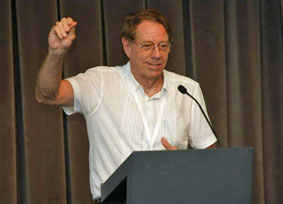
He made some simple but profound observations. Ecology - the sustainable part of sustainable wealth - is, he said, a dynamic process. The economy - the wealth part of the sustainable wealth - is also a dynamic process. Ecology is a complex planetary system; economics is a complex human system. Ecology is threatened by the economy; the economy is threatened by unsustainability.
Sustainability is a characteristic of dynamic systems that continue to function, perform essential processes, maintain dynamic balance and can change to adapt to changing conditions. Anything can be sustained: any system, organism, business, government, the human species, the biosphere, civilization, the economy. Different systems are sustained over different time frames: 100 years or more for an individual, Homo sapiens 200,000 years, planet Earth another billion years.
He made a distinction between individual and collective wealth and noted that war, revolution and violence are the destruction of wealth. He examined what most people mean by wealth: money, or material wealth. The purpose of life for many people is to become rich. But does wealth equal happiness? What is happiness?
Some people, he said, see material wealth as morally suspect, and there are, he admitted, religious texts that say that wealth can be a barrier between the individual and God, or can prevent a person from attaining his or her highest self. But, he went on, there are different sorts of wealth. For example, if you consider wealth as capital, then it is a means to invest and is an essential economic component along with labour. It empowers development and provides savings for the future.
And what is the purpose of the economy if not to generate material wealth? Dahl answered by quoting a statement of the Baha'i International Community:
The ultimate function of economic systems should be to equip the peoples and institutions of the world with the means to achieve the real purpose of development: that is, the cultivation of the limitless potentialities latent in human consciousness.
He talked about poverty - the absence of wealth, where people are unable to meet basic needs, feed or educate their children, or are homeless - and how the extremes of wealth and poverty destabilize society at all levels. He gave some examples of unsustainable wealth: fossil fuels; derivatives in financial markets; debt, growth and interest; the biggest multinationals who are beyond regulation.
Dahl drew on Eric Beinhocker's The Origin of Wealth to describe the elements of a successful business, one that has the right social architecture and culture, values and trust. Perhaps most fascinating was Dahl's description of different kinds of wealth. Knowledge, he said, is the true wealth. He examined social wealth: for the individual this might be the family, the community, social relationships, dignity, belonging to a group. For the collective it would include institutions of governance, laws, a system of justice. For the economy this would be businesses, structures of the economic system, banks and a financial system.
Intellectual wealth includes knowledge and the main knowledge systems of science and religion, arts, crafts and technologies. Interestingly, intellectual wealth increases the more it is shared. The accumulation of knowledge is the real wealth of a civilization.
He went on to consider spiritual wealth: 'You can't take it with you' as the saying about wealth goes, but maybe real wealth for the individual is what you can take with you: love, spiritual qualities, service to others.
Dahl ended his keynote with this thought set out by the Baha'i International Community:
...the pathway to sustainability will be one of empowerment, collaboration and continual processes of questioning, learning and action in all regions of the world.... As the sweeping tides of consumerism, unfettered consumption, extreme poverty and marginalization recede, they will reveal the human capacities for justice, reciprocity and happiness.
See the written paper, or download his presentation as pdf (166kb).
See also the ebbf blog at http://ebbf.org/blog/ebbf2013-thursday-intro-what-does-sustainable-weal…
and the ebbf photo album on facebook at https://www.facebook.com/media/set/?set=a.10151682003731801.1073741829…
FRIDAY 4 October 2013
What are the underlying principles that can help us co-create sustainable wealth?
Victoria Thoresen, IEF board member, director of PERL (The Partnership for Education and Research about Responsible Living), Associate Professor of Education at Hedmark University College, Norway, and a leading international expert on education for sustainable development, gave the first keynote of the second day of the ebbf/IEF conference, asking, "How can work on sustainable consumption and production empower individuals, organizations (including businesses) and institutions to co-create sustainable wealth in responsible ways?"
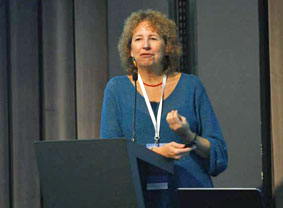
Thoresen reviewed the history of wealth, which she defined as an abundance of valuable resources: property, produce and people. She noted the changes in our economic system over time. For example, she said, when her mother passed away recently, she found a large number of family papers revealing that her American grandmother grew up in a home that kept slaves. She was shocked! She reflected that while slavery is today considered outside the economic system, slaves were an integral part of the economic system of the American south. How else to plant and pick the cotton, till the soil, keep the masters in luxury? They were an accepted part of the economic system and no one could think how to manage without them - it was the way the economic system worked at the time. But it was unsustainable, so it was challenged and a new economic system, without slaves, was developed and accepted.
We are in a similar situation today. The present economic system is also based on unsustainable assumptions and characteristics. So it too is being challenged and is changing. For example, today everything is about competition - the idea that 'I can beat you'. The whole society is based on this. But, Thoresen said, while we continue to measure the 'real' world in terms of monetary wealth, there is a revived interest in redefining 'wealth' in terms other than purely material/monetary ones. Our daily choices of the products we buy, she said, influence the physical and social environment, but these choices are now unsustainable. So, she asked, is this a shift in understanding and action that we must begin or is it already happening?
There are some controversial ideas about the how a new economic model might look. For instance, Tim Jackson has suggested that we need prosperity without growth, that we have to redefine prosperity and develop ways in which people can flourish with justice (Prosperity Without Growth, 2009).
Thoresen outlined the ways the economic system is changing from different perspectives: the human perspective, the technical perspective and systems perspective. But, significantly a values-based/spiritual perspective is also emerging.
The human perspective envelopes the concept that people are the real wealth of nations. Thoresen cited the Human Development Index, which provides indicators of social empowerment, security and economic growth and focuses on both human and social capital. Another example is the Millennium Development Goals, which are to realised by 2015 and the post MDGs, which are still under discussion. But the MDGs are still stuck in the old model of the economy. The development world itself does not know how to reach its goals - they think business will save them - but it will not be business as usual, but a new kind of business based on a different set of values.
The technical perspective takes in natural assets such as the land, forests, minerals; human assets, including education and skills; and physical (manufactured) assets. Thoresen pointed out the sustainability assessment indicators, such as living conditions, social inclusion, ecological footprints, and CO2 impact; as well as resource efficiency, including water, soil, air, forests, biodiversity and so on.
Thoresen asked participants whether any of them used international standards in their businesses and a number of hands went up. She highlighted particularly International Standard ISO26000 on Social Responsibility (which she helped to design), which covers issues of particular interest to ebbf members: organizational ethics, ethical consumerism, stakeholder involvement, accountability and transparency.
The systems perspective of wealth is well-being in relation to systems. She referred to The World Happiness Report and Bhutan's Gross National Happiness Index, which measures the population's general level of well-being. Western audiences did not recognize many of the indicators in the GNH Index, as they refer to spiritual practices such as prayer and meditation and fasting which are not well understood or practised in the West. Thus western analysts adapted the index to bring in 'psychological' indicators, rather than spiritual ones. Yet it is the values-based/spiritual perspective that is now emerging as an important way of understanding how the economy will change. This perspective embraces social justice, including wealth distribution, equity, collective trusteeship, generosity. It is about imbuing material actions with a sense of spiritual purpose. True wealth, Thoresen said, is the acquisition of spiritual qualities.
She listed the basic principles for the co-creation of sustainable wealth, providing a value base for co-creation of sustainable wealth:
- Connectivity and cohesion: empathy as a source of global cohesion, collective identification, a quest for universal belonging, a composite of concern, compassion and commitment
- Transference and transmutation
- Adaptation: collective social learning based on consultation, where you are open to new ideas
- Finiteness: moderation and sharing as means of managing resources
Thoresen told the story of her father, who worked in a factory making chicken pot pies. His sole task, day after day, was to put the chicken into the pies. He was totally bored with his job. Then one day he was allowed to do other tasks and his enthusiasm for the job increased. It is now well documented that to increase the welfare, productivity and happiness of workers, their tasks need to be diversified.
Accumulating true wealth involves:
- Stimulating a transformation of both our inner life and external conditions.
- Becoming more fully human and achieving a dynamic coherence between material and non-material requirements of life.
- Cooperating: Developing trust and compassion and inspiring the capacity for service
- Learning flexibility: Recognizing that our understanding changes and grows; what we once thought was right may not always be so.
- Fostering a vibrant community life in neighbourhoods and villages, characterized by such a keen sense of purpose.
Thoresen's talk stimulated a lot of discussion around the question of values, making changes in a business environment and what true wealth actually is. You can download the slides from her presentation.
See also the ebbf blog at http://ebbf.org/blog/ebbf2013-friday-morning-what-are-the-principles-un…
and the ebbf photo album at https://www.facebook.com/media/set/?set=a.10151683761906801.1073741830…
What new services, products and business models are successfully balancing ecological and economical priorities?
Arash Aazami, Founder/CEO of BAS Energie, gave an interactive presentation titled "Rethinking Energy" that opened our minds to new business models in response to the climate and energy crisis. BAS, an energy company of the future whose focus is on energy services rather than energy supply, shows how companies should be designed to last, based on business models that serve both economy and ecology. He led us through the - sometimes radical - decisions he had to make before his company became a serious alternative to energy supply companies.
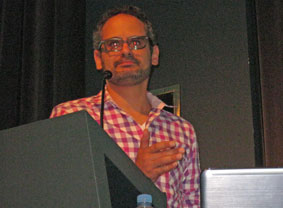
See also the ebbf blog at http://ebbf.org/blog/ebbf2013-friday-afternoon-what-new-business-models…
Parallel learnshops during Friday
1. How can work on sustainable consumption and production empower individuals, organizations (including businesses) and institutions to co-create sustainable wealth in responsible ways?
Victoria Thoresen examined the values the international community has committed itself to and looked at new approaches to product development and consumer choice-making within the realms of food, fashion, transport, housing, entertainment and personal growth. Participants reflected on how sustainable, responsible consumption and production can be conducive to increased wealth rather than merely being a negative process of reduction and denial. They reviewed evidence that, with the help of flexibility, creativity and determination, the work on sustainable production and consumption can contribute to increased well-being and personal, as well as communal, development.
2. Finding the soul, unlocking capacities for positive contributions. A strong organization is a community of like-minded people who love to work together based on the same principles. Based on these shared principles they take actions and they communicate. Sjoerd Luteyn led this workshop giving an introduction into how to find and define these principles in each participant's organization, identifying specifically those principles everyone shares, and starting to use these consistently in a dynamic world. Justice is the driving force for all actions and truth the driving force for all communication. What follows this is trust - the organization becomes a living, trustworthy community that contributes to a just, prosperous and sustainable civilization.
3. Helping you create your "dream enterprise". Jahan Tavangar and Monique Blokzyl shared their experience and offered key steps and processes to set up a dream enterprise, the kind of company that will make a positive impact in society.
4. Courage to Face the Unknown: Using Music to Find New Harmonies in Teams. Dorothy Marcic drew on her combined skills as a business school professor and producer of musicals to show the participants in this learnshop how to live in a world of increasing complexity with more enigmatic problems surfacing with greater frequency. As Einstein said, "No problem can be solved from the same level of consciousness that created it." Today's world needs new types of thinking, the opportunity to work with both LEFT and RIGHT brains. In order to unlock unused parts of the brain, she engaged participants in the collaborative creation of a musical, based on the idea of "shared incompetence," which has many applications in today's unpredictable business world. Each group wrote a 10-minute musical about some management/organizational issue which they performed Saturday night. This gave them a new appreciation for using aesthetics in decision-making and how music and the arts can bring new perspectives to old problems.
5. Now it's your turn to start with designing your own sustainable business. Arash Aazami, Founder/CEO of BAS, musician and lecturer provided examples, tools and ideas that show how to create sustainable wealth for you and those around you, serving both economy and ecology.
6. What are the Principles for a sustainable attitude? In this learnshop, Arthur Dahl discussed a number of principles about material wealth and about sustainability that provide the foundations for a sustainable attitude as it is expressed in our individual lives and in our professional activities, enterprises and institutions. Rethinking the concept and place of wealth in a sustainable economy is part of this. It considered the relevance of values such as justice, moderation, reciprocity and balance and their expression in our work and economic activities, and as guides to living and working in socially just and environmentally responsible ways. The texts studied can be downloaded as a presentation (pdf 99kb) or doc (27 kb).
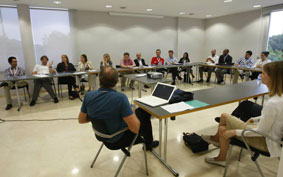
7. Driving to Results - tools for building unity and collaboration around change. Elizabeth Sobhani Walker of Lotus Consulting led an interactive workshop sharing a framework for addressing change in a way that builds greater alignment, unity and results. Using a client example she illustrated the collaboration between a leading real-estate company, an education-based nonprofit and the various levels of Chinese government to infuse the local education system with a new way of teaching focusing on character development. Participants had the opportunity to apply this change management framework to their own challenges, and to define some of the key steps to create greater unity and manage the change process.
8. Taking ebbf meaningful conversations to your community: how to use ebbf's action labs. Stephanie Hughes Akkaoui introduced the ebbf action lab process, an effective way to start meaningful conversations in local communities, leading to a cycle of action and reflection. Participants learned how to create their own local learning communities, stepping into action and contributing to a prosperous, just and sustainable civilization, one conversation, one action, one community at a time. More information about ebbf action labs is on the dedicated ebbf webpage: http://ebbf.org/contribute/action-lab.
See also the ebbf photo album on facebook at https://www.facebook.com/media/set/?set=a.10151684167441801.1073741831…
SATURDAY 5 October 2013
How can we start the transition to a new business model that embeds a "sustainable attitude" at its core?
Farzam Kamalabadi - President & Chairman of the Board, Future Trends Group, offered a view on how China is approaching a "sustainable attitude" an intriguing view of one of the most challenging world environments where the push for growth and the desire to balance sustainability are most strident. He asserted that China will become a major contributor to the advancing world civilization.
He became involved with China more than 30 years ago and has been living there since 1987. He has a profound love for and understanding of the people and the culture and has become one of the premier calligraphers in the country. His Green Soul movement, inspired by the idea that 'the earth has no problem, the problem is people and people have no problem, they need to rediscover their soul', has attracted thousands of people across the country.
Farzam Kamalabadi outlined the history and political structure of China and looked particularly at its spiritual history, which is at least 20,000 years old. There is now a revived interest in this spiritual soul of China among people who for so many years have not had an opportunity to learn about it and express it. For example, in 1983, there were 70-90 million Buddhists in China but now there are 200-300 million; there were 30 million Christians but now there are some 100-200 million; while in 1983 there were about 30 million Muslims and now there are 50 million plus.
China is moving, Kalamabadi said, from being an introverted country to an extroverted one for the first time in 35 years; it is moving from being from the imitator and follower of concepts, ideas and inventions to being a contributor and a leader.
It now has the opportunity to make a significant contribution to the emerging world civilization. The question is whether its path will be a militant one, which grabs resources, or one where it is a leader of ideas and peace, contributing its unique characteristics to that world civilization.
Kalamabadi firmly believes that China is on the cusp of what he says is the world's third most significant revolution. The first, he said, was the European renaissance, the second the discovery and development of the Americas. This third, he asserted, will be more far-reaching, more important than either of these two - it will be a peaceful, spiritual revolution.
He looked at how this is coming about, outlining the future trends based on what has already taken place. Most significantly has been the change from a state ideology of the universal class struggle to a new ideology of the harmonious society, a process that took place from about 1990 to 2005. Chinese leaders support the concept of 'China's peaceful rise', based on the reinstatement and adoption of China's ancient spiritual heritage. The historical name of China is 'the continent of God', that is, 'the Divine Land'. This was its name 8000 years ago. Kalamabadi realized that China has always been inspired by higher, more noble values than the materialistic direction of its recent past and this concept has been embraced quickly.
One example of this renewal of China's new direction as a country of peace and profound spirituality has been its decision to give every country a 'Statue of Peace'. Just as France gave the United States a Statue of Liberty to represent one of its most important values, China's Statues of Peace are a symbol of its own value of world peace and harmony. The most recent statue was unveiled in Haifa, Israel, at a municipal ceremony, that exemplified China's new mission - to serve the world of humanity.
See also the ebbf blog at http://ebbf.org/blog/ebbf2013-saturday-morning-what-are-some-new-approa…
What Innovative Collaborative Initiatives are co-creating sustainable wealth?
Roxann Stafford of Second Muse, after their recent visit to the White House to finalise their Global Day of Civic Hacking allowing the US Government, Google, NASA and civil society to co-create new solutions, presented their view on the new era of collaboration and how it will help to co-create sustainable wealth.
Parallel learnshops during Saturday
1. Green Soul Movement, China's Positive Influence and Impact to the World. Farzam Kamalabadi shared insights on the path towards a balance of sustainability and profit from the new enterprises that are unfolding in China and what we can learn from China's own "green soul movement"?
2. From leadership to inspired individuals - what is new in the way we create change and develop sustainable wealth? Mika Korhonen explained that leadership is not a position or a role, it is a synonym for action. The notion of leadership will not exist in the future and it is time to start thinking beyond that definition, placing ourselves instead in this new role of inspired individuals. The learnshop explored why and how creating change in society/culture/work place is different now from a decade a go, and the role of individuals in driving the change and showing what are we "expected" to do.
3. ebbf accompaniment - helping and learning by co-creating an ebbf project that will serve the global ebbf audience. Daniel Truran led this group in becoming protagonists to co-create an ebbf online interactive course to bring together the learning, insights and experiences of the diverse and innovative ebbf membership.
4. How can we learn from and apply Second Muse's ability to co-create prosperity by applying the art and science of collaboration to solve complex problems? Roxann Stafford and Ruha Reyhani of SecondMuse, an innovation and collaboration agency, showed how they co-create prosperity by applying the art and science of collaboration to solve complex problems. Using the example of the lost generation in Spain, the learnshop demonstrated how to learn from this evolutionary process which is not only attracting some of the global key players but most importantly helping them to effectively collaborate and co-create solutions that help bring about prosperity.
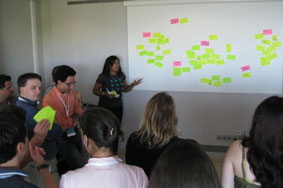
5. ebbf accompaniment - how can we create effective partnerships with like-minded organisations? Mahmud Samandari shared his experience to show participants how to connect and partner with other like-minded organisations, by fostering ties and sharing experiences that bring about mutually beneficial collaboration.
6. Structuring companies for Responsibility: from Shareholder to Citizen. In answer to the question "What is a Company for?", IEF member Graham Boyd explored the answer, using the recent re-structuring of his own company, LTSGlobal, as a starting point. The group discussed how the assumptions typically used in defining company structures and processes are today hindering getting truly sustainable businesses, where the company does what it is there for. He explained that the structures we use today were right the past, led to good, sustainable business practices in the past, and still have some validity in today's world. However, the world is a very different place today, with global challenges never seen before. Enabling us to address these is a global sense of humanity never seen before; global businesses at a scale never seen before; and a range of human capacity never seen before. The learnshop discussed how to update what a company is for, doing for companies what was done for countries a century or more ago. Examples were: decoupling the right to own from the right to engage in governance; changing from structures centred on Shareholders to structures based on Citizens. This would restore what a company is for: to be an excellent tool to organise large numbers of people to deliver what society needs to thrive; and for the employees to thrive better together than they can individually.
How can we empower individuals to co-create new sustainable models in their workplaces?
Dorothy Marcic, after celebrating the 3rd anniversary of her off-Broadway musical "Sista", this best selling author of new management models offered us a meaningful evening musical co-creation by the participants in her workshops.
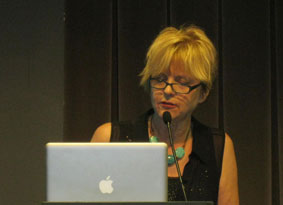
See also the ebbf photo album on facebook at https://www.facebook.com/media/set/?set=a.10151686737226801.1073741833…
SUNDAY 6 October
What do I now feel inspired and comfortable to achieve in my workplace to co-create sustainable wealth, with the new concepts and connections made during the event?
Elizabeth Walker Sobhani, director at Lotus Consulting came from China to speak on "From Concept to Reality - Creating Shared Value". She explained the Creating Shared Value model, the implementation challenges and lessons learned for developing shared value opportunities. She defined shared value as the combination of wealth creation and the well-being and prosperity of society. Her talk explored the spectrum of activities from corporate philanthropy to the latest innovations around creating shared value as a means of generating business and social impact. These include:
1. re-conceiving products and services, for new markets or with lower costs;
2. redefining the value chain, including the sustainable use of natural resources;
3. strengthening local clusters, including local suppliers, infrastructure and employees.
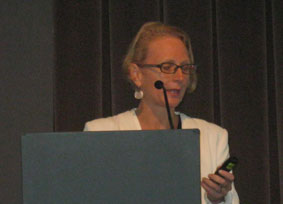
Business definition has to start at the top, with a vision and mission including a social mission. The business culture needs to include values such as empathy, service, creativity, trust and humility. She provided practical lessons learned while mobilizing these concepts: it takes time, you need a clear social purpose, there should be change champions and a learning culture, measure progress and communicate the social impact and the profit. Benefits come with scale. She encouraged partnerships between civil society organizations and businesses. She concluded with the role we can play in creating shared value in our own businesses.
Some IEF members attending the conference
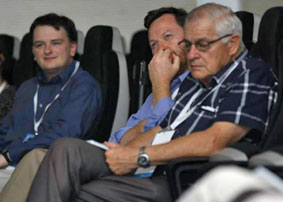 .
. 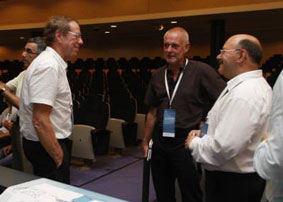 .
. 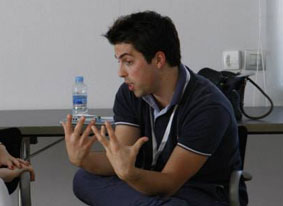
Jason Maude, Daniel Truran, Dale Allen; Arthur Dahl, Les Gornall; Andreas Vatsellas
The IEF Annual General Assembly was held on Friday 4 October at 18:00 at the Gran Hotel Rey Don Jaime in Barcelona, where it elected the Governing Board, consulted on progress as described in the IEF Annual Report 2012-2013 and made recommendations for future activities. See the Report of the General Assembly.
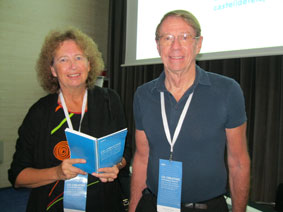 .
. 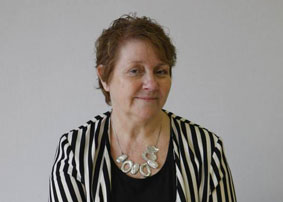
IEF board members Victoria Thoresen and Arthur Dahl; newly-elected board member Wendi Momen
For a more complete photo album from the conference, see http://yabaha.net/dahl/travel/t2013/Barcelona/Barcelona.html
